List of political parties in Pakistan
Pakistan is a multi-party democracy. The country has many political parties and many times in past the country is ruled by coalition government.
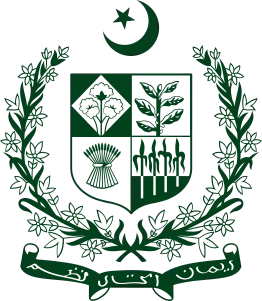 |
|---|
| This article is part of a series on the politics and government of Pakistan |
|
|
The Parliament of Pakistan is bicameral, consisting of the National Assembly of Pakistan and the Senate.
Brief history and overviews
Till 1990, Pakistan Peoples Party (PPP) was the only major party of Pakistan. After Zulfiqar Ali Bhutto died, Benazir Bhutto took control and they remained a strong position throughout Pakistan. In 1990, Nawaz Sharif of Islami Jamhoori Ittehad (IJI) won the elections. Two major parties were in Pakistan. After IJI dissolved and Nawaz Sharif founded Pakistan Muslim League (N), PPP and PML(N) were the major two parties of Pakistan. In 1993, Peoples Party won the election again. In 1996, Pakistan Tehreek-e-Insaf was formed. In 2013, PTI took part in the elections and won 35 seats in the National Assembly of Pakistan. After the 2018 Pakistan elections, PTI became the government and became one of the three major parties of Pakistan.
In 2019, Pakistan Democratic Movement (PDM) was formed of many parties.
Gilgit-Baltistan
Pakistan Peoples Party won the first Gilgit-Baltistan elections and was the only major party of Gilgit-Baltistan with 20 seats out of 33. However in 2015, Pakistan Muslim League (N) won 15 seats and became the major party of Gilgit-Baltistan and PPP only received one seat in the Gilgit-Baltistan Assembly. However in the 2020 elections, Pakistan Tehreek-e-Insaf (PTI) won 16 seats and became the only major party of Gilgit-Baltistan with PPP winning 3 and PML(N) winning two seats.
Currently in Gilgit-Baltistan, any party can win and any party can go down.
Major parties
Pakistan Tehreek-e-Insaf (PTI)
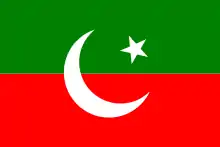
Imran Khan leads Pakistan Tehreek-e-Insaf (PTI) (Pakistan Movement for Justice) under the slogan: "Change".
On 25 April 1996, in Lahore, the PTI, a social democratic and Third Way political movement, was founded by Imran Khan. The PTI boycotted the 2008 elections but became more politically active by 2011.
The PTI claims to represent all Pakistanis regardless of religion, ethnicity, language or residence .
It aims to create a modern, egalitarian, Islamic democratic and welfare state.[1][2][3] The PTI promotes a nationalist agenda, arguing that terrorism, extremism and radicalism have increased since Pakistan joined the War on Terror.
In 2013, PTI as the country's second most popular party in 2013 elections.
It is currently the ruling party in the country. In 2018 General Elections, Imran Khan became the Prime Minister of Pakistan and PTI secured 116 seats in National Assembly and made a clean sweep in KPK by taking 63 seats in Provincial Assembly. PTI also formed Government in Punjab, took majority of seats in the largest city of Karachi and collaborated with Government in Balochistan.
Pakistan Muslim League (N) (PMLN)
.svg.png.webp)
Pakistan Muslim League (N) is a large Centre-Right, political party of Pakistan, tracing its history to the All-India Muslim League that played a central role in the creation of Pakistan under the leadership of Quaid-i-Azam Mohammad Ali Jinnah. Pakistan Muslim League re-emerged onto the national political scene in Pakistan as part of the Islami Jamhoori Ittehad coalition against the Pakistan Peoples Party in the elections held in 1988.
PML-N served two terms in the 1990s with Nawaz Sharif as the Prime Minister. His second term in office was cut short by a military coup defeat led by General Musharraf. PML-N boycotted the general elections in 2002.
In the 2008 elections, PML-N formed government in the province of Punjab. In 2013 elections, the PML-N secured a majority in the National Assembly. It formed government in the center, Punjab and a coalition government in the province of Balochistan, followed by governments in Azad Jammu and Kashmir, and Gilgit-Baltistan. Nawaz Sharif was elected Prime Minister for the third time in 2013. In the general elections of 2018, PTI completely marginalised it by winning majority of seats and making government in center and three of the provinces.In 2020, PMLN joined Pakistan Democratic Movement (PDM).
Pakistan People's Party (PPP)
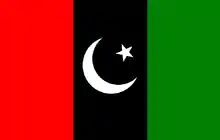
On 30 November 1967, the Pakistan Peoples Party (PPP), a democratic socialist party, was founded by Zulfikar Ali Bhutto (1928–1979). The PPP ran in the 1970 general election with a socialist agenda of Roti, Kapra, Makan (Food, clothes, shelter). It favoured ties with China over the Western nations and ruled Pakistan after the Fall of Dhaka. After completion of first parliamentary term, the PPP succeeded in the Elections of 1977 but were quickly overthrown by Zia ul Haq. Under Benazir Bhutto, the PPP became a secular party that promoted Social Liberalism as well as privatisation to secure funding from the US and the World Bank. From March 2008 to March 2013, it was leading party of the ruling coalition. Party faced defeat in elections of 2013. The PPP currently holds 41 senate seats and 42 national assembly seats.[4]
Jamaat-e-Islami Pakistan (JI)
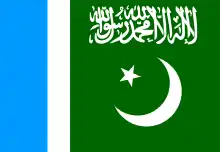
Jamaat-e-Islami Pakistan is a socially conservative and Islamist political party based in Pakistan. Its objective is the transformation of Pakistan into an Islamic state, governed by Sharia law, through a gradual legal, and political process.[5] JI strongly opposes capitalism, communism, liberalism, socialism and secularism as well as economic practices such as offering bank interest. It strongly believes in a respectable role of women in society, rather than using women as objects of advertisement.[6]
JI is a vanguard party: its members form an elite with "affiliates" and then "sympathizers" beneath them. The party leader is called an ameer.[7]
Through its welfare wing Al-Khidmat, JI runs several welfare projects including orphan sponsorships, free hospitals & food distribution plans.[8][9]
Pak Sarzameen Party (PSP)

The Pak Sarzameen Party is a Pakistani political party founded by Syed Mustafa Kamal (former mayor of Karachi) in 2016. The party is currently led by Mustafa Kamal followed by other members of the party. Syed Mustafa Kamal founded the party on Pakistan Day 2016 at a press conference in Clifton, Karachi. The ceremony was attended by many members even from MQM. PSP had many differences with MQM. Many members from MQM left and joined PSP. In the 2018 Pakistan general elections, PSP failed to achieve a seat in the National Assembly of Pakistan or any provincial assemblies of Pakistan. Mustafa Kamal told that there were unfair elections.
On 25 July 2019, Pak Sarzameen Party did their first jalsa after elections which was a huge success.
Awami National Party (ANP)
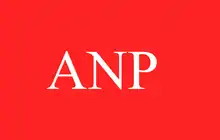
In 1986, the Awami National Party (Popular National Party, ANP) was founded by Abdul Wali Khan. It is a leftist, secular party that promotes Pashtun nationalism, democratic socialism, public sector government, and economic egalitarianism. It supports ties with Afghanistan, India, and historically the Soviet Union.[10] The ANP held 7 seats in the senate and 3 seats in the National Assembly. Asfandyar Wali Khan, grandson of Bacha Khan is the incumbent president of the ANP. Between 2008 and 2013, it was part of the ruling PPP led coalition.[11] It performs well in Pashtun dominated areas in and around Khyber-Pakhtunkhwa and the Balochistan provinces.
Awami Workers Party (AWP)
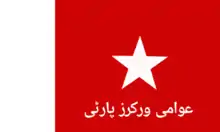
In November 2012, the Awami Party, Labour Party and Workers Party merged to form the Awami Workers Party in an unprecedented effort to build a genuine Left-wing politics alternative to mainstream political forces in Pakistan. The party's programme was designed to bring together the disparate struggles of workers, peasants, students, women, ethnic, and religious minorities in Pakistan under the banner of a democratic socialist-feminist politics. AWP supports people's struggles around the country, from working with peasants on land rights and water access in Buner, supporting the tenant farmer's movement for land rights in Okara, organizing brick-kiln workers against bonded labor and wage abuse in Punjab, supporting the struggles of textile and power-loom workers in Faisalabad for human wages, social security and improvement in work conditions, organizing peasants and working classes against abuses by elites and for an equitable land distribution in Sindh, standing in solidarity with historically oppressed ethnic groups such as the Baloch, Hazara and multi-lingual communities of Gilgit-Baltistan, to the construction of alliances with trade unions against neoliberal privatization and contract labor across the country. AWP has organized resistance against forced evictions from slums in Islamabad and managed to secure a stay order from the Supreme Court of Pakistan to prevent any further demolitions of slums following the Capital Development Authority's operation that razed the Katchi Abadi (slum) in Sector I-11.[12]
Jamiat-e-Ulema-e-Islam (F)

Jamiat Ulema-e-Islam (F) (Assembly of Islamic Clergy, JUI-F) is an ultra-conservative religious and theocratic party with ideological history of 100 years which, in 2002, formed a ruling coalition with Muttahida Majlis-e-Amal in Khyber Pakhtunkhwa and with the PML(Q) in Balochistan. It currently holds 14 seats in the National Assembly, 4 seats in the Senate, 15 seats in the Provincial Assembly of Khyber Pakhtunkhwa, 11 seats in the Provincial Assembly of Balochistan and 1 seat in the Gilgit Baltistan Assembly. Its economic policy is socialist and moderate.[13]
The president of JUI-F is Fazal-ur-Rehman who is also the current leader of Pakistan Democratic Movement.
Muttahida Qaumi Movement (MQM)
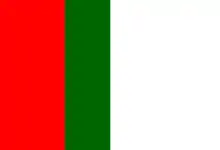
The Muttahida Qaumi Movement (United National Movement, MQM) was founded in 1978 by Altaf Hussain (who went on, in 1984, to found the Muhajir Quami Movement) from the student organisation, the All Pakistan Muhajir Student Organization (APMSO). It is supported by the urban Muhajir community of Sindh.[14] The MQM is socially liberal and democratic. In 1997, the MQM officially removed the term Muhajir, which refers to Urdu-speaking Muslims and replaced it with Muttahida (United). Between 1992 and 1999, the Pakistan Army, in Operation Cleanup, attempted to suppress the MQM.[15] On 11 September 2001, the MQM condemned attacks by al-Qaida in the US with public demonstrations.[16] Dr Farooq Sattar MQM 2018.[17]
Balochistan National Party (Mengal) (BNP-M)
The Balochistan National Party (Mengal) is a political party in Balochistan, Pakistan. BNP believes in more provincial rights and greater autonomy for Balochistan province through peaceful and democratic struggle.

In 1996, Ataullah Mengal returned to Pakistan and formed the Balochistan National Party. BNP swept the 1997 elections and was able to form a coalition government in Balochistan with Sardar Ataullah Mengal's son, Akhtar Mengal as the Chief Minister. This government did not last long as, soon, differences began arising between the Balochistan Provincial Government and the Federal Government.
Pakistan Muslim League (Q) (PMLQ)
.svg.png.webp)
Pakistan Muslim League (Q) is a centrist to centre-right-nationalist political party in Pakistan. As of the 2018 parliamentary election, it has a representation of 5 seats. It previously served as an ally of former Prime Minister Raja Pervez Ashraf's government, and led a joint election campaign in 2013 alongside Pakistan Peoples Party (PPP) in Punjab and Balochistan provinces against its rival Pakistan Muslim League (N), a fiscally conservative and centre-right force.
Minor or regional parties
- Awami National Party
- Awami Workers Party
- Balochistan Awami Party
- Communist Party of Pakistan
- Hazara Democratic Party
- Balochistan National Party (Awami)
- Balochistan National Party (Mengal)
- Communist Mazdoor Kissan Party
- Mazdoor Kisan Party (MKP)
- Majlis-e-Ahrar-e-Islam
- Mustaqbil Pakistan
- National Party
- National People's Party (NPP)
- Pakistan Mazdoor Kissan Party (PMKP)
- Pakistan Women Muslim League (first women's political party in Pakistan)
- Sindh Democratic Alliance
- Sindh National Front
- Sindh Taraqi Pasand Party
- Sindh United Party
Senate
| Party | Seats |
|---|---|
| Pakistan Tehreek-e-Insaf | 18 |
| Pakistan Peoples Party | 19 |
| Pakistan Muslim League (N) | 30 |
| Awami National Party | 6 |
| Jamiat Ulema-e-Islam (F) | 5 |
| Muttahida Qaumi Movement | 8 |
| Pakistan Muslim League (Q) | 4 |
| Balochistan National Party Awami | 2 |
| Jamat-e-Islami Pakistan | 2 |
| PkMAP | 3 |
| Independents | 10 |
| Others | 7 |
| Total | 104 |
National Assembly
| Affiliation | Members | |
|---|---|---|
| Pakistan Tehreek-e-Insaf | 156 | |
| Pakistan Muslim League (N) | 82 | |
| Pakistan People's Party | 53 | |
| Muttahida Qaumi Movement | 6 | |
| Muttahida Majlis-e-Amal | 12 | |
| Pakistan Muslim League (Q) | 3 | |
| Pakhtunkhwa Milli Awami Party | 4 | |
| National Peoples Party (Pakistan) | 3 | |
| Awami National Party | 2 | |
| Others | 7 | |
| Independents | 8 | |
| Total |
342 | |
| Ruling coalition majority |
176 | |
Members of the PML(N) are marked in bold text
| General elections | Voting percentile % | Voting turnout | Seating graph | Presiding chair of the party | Parliamentary position |
|---|---|---|---|---|---|
| 1985 | 46.4% | – | 96 / 200 | members participated as non-partisan | In alliance with Zia |
| 1988 | 30.2% | 5,908,741 | 56 / 207 | Fida Mohammad Khan | In Opposition |
| 1990 | 37.4% | 7,908,513 | 106 / 207 | Nawaz Sharif | In Government |
| 1993 | 39.9% | 7,980,229 | 73 / 207 | Nawaz Sharif | In Opposition |
| 1997 | 45.9% | 8,751,793 | 155 / 207 | Nawaz Sharif | In Government |
| 2002 | 12.71% | 3,791,321 | 18 / 207 | Javed Hashmi | In Opposition |
| 2008 | 19.6% | 6,781,445 | 91 / 342 | Nisar Ali Khan | In Opposition |
| 2013 | TBD | TBD | 186 / 342 | Nawaz Sharif | In Government |
| General elections | Voting percentile % | Voting turnout | Seating graph | Presiding chair of the party | Parliamentary position | |
|---|---|---|---|---|---|---|
| 1970 | 18.6% | 6,148,923 | 81 / 300 | Zulfikar Bhutto | In Government | |
| 1977 | 61.1% | 10,148,040 | 155 / 200 | Zulfikar Bhutto | Martial law in effect | |
| 1985 | Non-participant | – | – | Nusrat Isphani | – | |
| 1988 | 38.5% | 7,546,561 | 94 / 207 | Benazir Bhutto | In Government | |
| 1990 | 36.8% | 7,795,218 | 44 / 207 | Benazir Bhutto | In Opposition | |
| 1993 | 37.9% | 7,578,635 | 89 / 207 | Benazir Bhutto | In Government | |
| 1997 | 21.8% | 4,152,209 | 17 / 207 | Benazir Bhutto | In Opposition | |
| 2002 | 25.7% | 62 / 207 | Amin Fahim | In Opposition | ||
| 2008 | 30.6% | 10,606,486 | 124 / 342 | Benazir Bhutto Yousaf Raza Gillani | In Government | |
| 2013 | TBD | TBD | 44 / 272 [18] | Bilawal Bhutto | In Opposition |
| General elections | Voting percentile % | Voting turnout | Seating graph | Presiding Convener of the party | Parliamentary position |
|---|---|---|---|---|---|
| 1988 | 1.8% | 360,526 | 7 / 207 | Fazal-ur-Rehman | In alliance with PPP |
| 1990 | 2.9% | 622,214 | 6 / 207 | Fazal-ur-Rehman | In Opposition |
| 1993 | 3.2% | 645,278 | 3 / 207 | Fazal-ur-Rehman | In alliance with PPP |
| 1997 | 1.7% | 325,910 | 2 / 207 | Fazal-ur-Rehman | In Opposition |
| 2002 | 11.3% | – | 63 / 272 | Fazal-ur-Rehman | In Opposition |
| 2008 | 2.2% | 772,798 | 6 / 272 | Fazal-ur-Rehman | In alliance with PPP |
| 2013 | TBD | TBD | 10 / 272 | Fazal-ur-Rehman | In alliance with PML-N |
| General elections | Voting percentile % | Voting turnout | Seating graph | Presiding chair of the party | Parliamentary position |
|---|---|---|---|---|---|
| 1988 | 2.1% | 409,555 | 2 / 207 | Abdul Ghaffar Khan | In alliance with PPP |
| 1990 | 1.7%% | 356,160 | 6 / 207 | Abdul Ghaffar Khan | In Opposition |
| 1993 | 1.7% | 335,094 | 3 / 207 | Abdul Vali Khan | Remain in Neutrality |
| 1997 | 1.9% | 357,002 | 10 / 207 | Abdul Val Khan | In Opposition |
| 2002 | 1.0% | – | 0 / 272 | Abdul Vali Khan | — |
| 2008 | 2.0% | 700,479 | 10 / 272 | Asfandyar Vali | In alliance with PPP |
| 2013 | TBD | TBD | 1 / 272 | Asfandyar Vali | In Opposition |
| General elections | Voting percentile % | Voting turnout | Seating graph | Presiding Convener of the party | Parliamentary position |
|---|---|---|---|---|---|
| 1985 | 3.9 | 818,962[19] | 11 / 207 | Altaf Hussain | In alliance with Zia |
| 1988 | Non-participant | – | 0 / 207 | Imran Farooq | — |
| 1990 | 5.5% | 1,172,525 | 15 / 207 | Altaf Hussain | In Opposition |
| 1993 | Non-participant | – | 0 / 207 | Altaf Hussain | See: Operation Blue Fox |
| 1997 | 4.0% | 764,207 | 12 / 207 | Farooq Sattar | In Opposition |
| 2002 | 3.1% | – | 13 / 272 | Farooq Sattar | In alliance with Musharaf |
| 2008 | 7.4% | 2,507,813 | 25 / 272 | Babar Ghauri | In alliance with PPP |
| 2013 | TBD | TBD | 18 / 272 | Faisal Sabzwari | In Opposition |
Dissolved Parties
| Party | Founded | Dissolved |
|---|---|---|
| Muslim League | 1947 | 1958 |
| Pakistan Socialist Party | 1948 | 1958 |
| Krishak Sramik Party | 1929 | 1958 |
| All Pakistan Awami Muslim League | 1949 | 1971 |
| Pakistan Muslim League | 1962 | 1971 |
References
- Khan S. M. "Pakistan's creation pointless if it fails to become Islamic welfare state." Pakistan Tribune 27 June 2012.
"Imran Khan said on Wednesday that Pakistan's creation had been pointless if the country fails to become an Islamic welfare state." - Michaelsen M. "Pakistan's dream catcher." Qantara 27 March 2012. "Iqbal's work has influenced Imran Khan in his deliberations on an Islamic social state."
- "Constitution of Pakistan Tahreek e Insaaf" Archived 2 March 2013 at the Wayback Machine Insaf party website.
- "Senate position" Government of Pakistan.
- Haqqani, Pakistan between Mosque and Military (2005), p. 122.
- https://www.samaa.tv/news/pakistan/2020/03/we-share-some-of-aurat-marchs-demands-ji-office-bearer/
- Salim, Muhammad Said (2012), "India: Jamaat-e-Islami", in Gholamali Haddad Adel; Mohammad Jafar Elmi; Hassan Taromi-Rad (eds.), Muslim Organisations in the Twentieth Century: Selected Entries from Encyclopaedia of the World of Islam, EWI Press, pp. 67–, ISBN 978-1-908433-09-1
- https://tribune.com.pk/story/1132200/welfare-sindh-al-khidmat-spent-rs140m-last-year/
- https://www.thenews.com.pk/print/239944-JI-amir-inaugurates-welfare-hospital
- "Pakistan" The World Factbook, Central Intelligence Agency Accessed 5 January 2013.
- "Pakistan's 'Gandhi' party takes on Taliban, Al Qaeda". The Christian Science Monitor. 5 May 2008. Retrieved 9 May 2008.
- Abbasi, Munawer Azeem | Kashif (31 July 2015). "Hundreds of homes reduced to dust". Dawn. Pakistan. Retrieved 30 July 2018.
- Daily Times, Pakistan. 14 December 2008.
- "Pakistan: Human rights crisis in Karachi." Archived 4 November 2006 at the Wayback Machine Amnesty International 1 February 1996. Retrieved 26 July 2009.
- Haq F. "Rise of the MQM in Pakistan: Politics of Ethnic Mobilisation." Asian Survey, University of California Press 1 November 1999 35(11) p990 – 1004 doi=10.1525/as.1995.35.11.01p00677 Accessed 3 August 2009.
- "MQM is a liberal and democratic party: Altaf." Daily Times, Pakistan 26 May 2008. Retrieved 17 May 2011.
- "Farooq Sattar vows to fight for Printing Press Quarters residents" The Express Tribune, 30 August 2018. Retrieved 02 September 2020.
- "Election Results 2013". Geo Election Monitoring Cell. Archived from the original on 12 June 2013. Retrieved 28 May 2013.
- Irfan Ali Shaikh. "Acid test for MQM". October 04, 2002. Archived from the original on 5 November 2012. Retrieved 16 May 2013.
External links
| Wikimedia Commons has media related to Political parties in Pakistan. |
- Major Political Parties in Pakistan South Asian media
- Complete List of Political Parties in Pakistan with Head Names and Addresses ELECTION LIVE NEWS